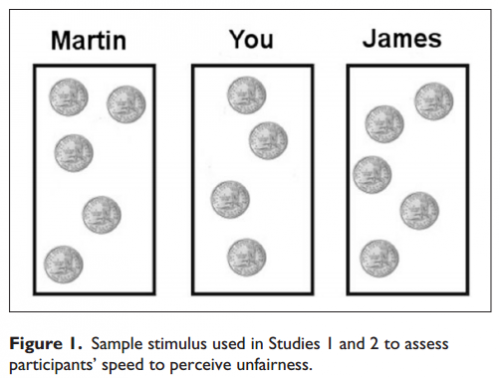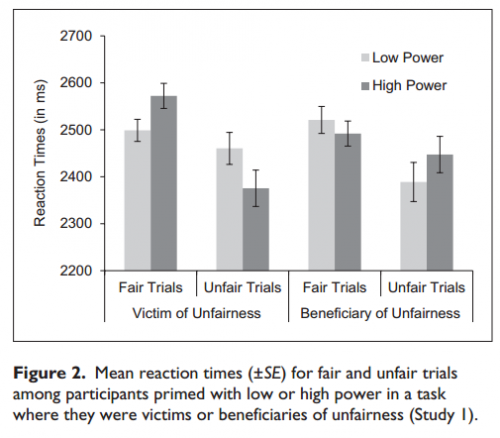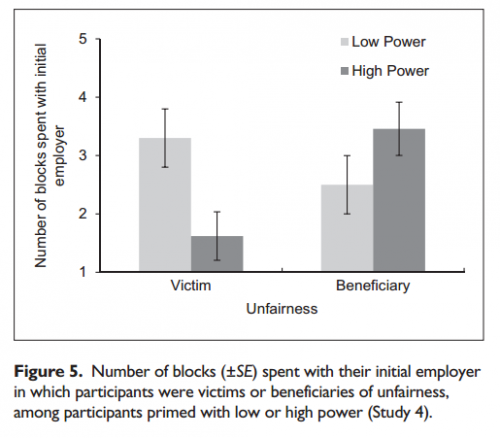 Compared to the less powerful, more powerful people feel more entitled to be treated fairly, are quicker to identify an instance in which they are mistreated, and more likely to take action in response.
Compared to the less powerful, more powerful people feel more entitled to be treated fairly, are quicker to identify an instance in which they are mistreated, and more likely to take action in response.
These are the findings of a new study by social psychologist Takuya Sawaoka and colleagues. They defined power as “disproportionate control over other people’s individuals’ outcomes.” I imagine someone who is a boss, perhaps, or a police officer, professor in a classroom, or patriarch of a family, or even just people who are wealthy and can pretty much pay people to do anything they want.
The scholars review the literature showing that people with power are entitled to a disproportionate share of resources and more likely to cheat, steal, and lie. They hypothesize that this “individual variability in entitlement shapes people’s reactions to injustices that they experience” and designed a series of studies to test it.
In the first study, participants were primed to feel either powerful or powerless by being asked to write about and reflect on a situation in which they felt they had power over someone else or, alternatively, someone had power over them. They were then instructed to play a game with a confederate (unknown to them) who had ten tokens that they could divide up however they pleased. Participants who had been primed to feel low power expected to get less than half the tokens, but participants who had been primed to feel powerful expected a fair outcome.
They then tested individuals’ sensitivity to unfairness. They showed people primed to feel powerful and powerless distributions of tokens that looked liked this, but with varying amounts, and asked them to indicate whether the distribution was fair or unfair.
Their measure of sensitivity was how quickly the person identified the distribution as unfair. Their findings showed that, when they were the victim of unfairness (see the second pair of columns from the left), people feeling powerful were quicker to identify it as unfair (a lower bar = faster) than were people feeling powerless.
But, when they benefited from unfairness (see the pair of columns on the far right), people feeling powerful were slower to identify it as unfair than when they were the victims and slower than people who felt powerless.
They had similar findings when people primed to feel powerful didn’t directly benefit, but simply observed other people being treated unfairly. And, they tested whether their findings extended to interpersonal justice, too, by asking how people responded to being socially excluded. They found the same pattern.
Finally, they found that, when being treated unfairly, participants primed to feel powerful were quicker to take action than those primed to feel powerless. The two columns on the left below show that high power people quickly left a hypothetical employer for a different one if they were treated unfairly.
So, to conclude, people who are primed to feel powerful feel entitled to fair treatment — both economically and socially — and are quick to recognize and correct it when they are treated unfairly, but they are significantly less likely to notice or care when the less powerful are injustice’s victims.
Lisa Wade, PhD is an Associate Professor at Tulane University. She is the author of American Hookup, a book about college sexual culture; a textbook about gender; and a forthcoming introductory text: Terrible Magnificent Sociology. You can follow her on Twitter and Instagram.



Comments 6
Bill R — June 9, 2015
Milgram and Zimbardo, whose works were shocking but not surprising 55+- years ago, would agree...
David — June 17, 2015
Bruh, I just wanted to fix my controller sensitivity in the Injustice game on Steam.
On beauty standards | Just some things I'm working out — February 8, 2016
[…] It also gets to me how many men just straight up don’t give a shit about anything that happens… If anyone is being hypocritical, it’s the people who do this. Whenever I see arguments like this against feminists whenever boys or men start to suffer from the same problems we’ve been fighting for ages, I liken it to watching two villages struggling in a bad storm. One is against the shoreline and it’s been bracing itself against an unrelenting tsunami while the other village, which is situated safely behind it, is starting to flood from a few leaky pipes they could easily fix and even caused to leak. Then the second village, who has overwhelming taken the stance to stand back and watch, ignore, and sometimes even sabotage the first villages attempts to save itself, says to the first “Why aren’t you here helping me?! Can’t you see I’m up to my ankles in water?! It’s getting deeper! You hypocrites! You complain about flooding but you aren’t helping US!” If the second would have helped and cared to begin with there would be less of a struggle for all and maybe their village wouldn’t have started flooding too. Dudes, if you’re ever talking about gender issues and you feel like you’re being blown off, it’s not that we don’t believe or that we don’t care. We do. But think of the villages. How would YOU react if you were the one pushing back against the tsunami and someone with water up to their ankles is complaining about it and expecting you to rush to their aid? Now imagine what that’s like when they actively want your village to flood or they deny yours is flooding, but they still expect you to help them in their ankle-deep water. It’s hard to be sympathetic sometimes. […]
Powerful People Are Sensitive to Injustice But Mostly When They Are Its Victims | Adios Barbie — August 3, 2016
[…] By Lisa Wade Phd, originally cross-posted at Sociological Images […]
About some white people – Just some things I'm working out — June 26, 2017
[…] disproportionately angry ways because when powerful groups feel the tiniest bit of discrimination, they blow it up to be the worst thing ever. They do this because it gives them the chance to deflect criticisms directed towards them, it […]
Thomas — January 3, 2024
🚀 Welcome to a personalized education solution tailored just for you! If you're feeling overwhelmed by your coursework, deadlines, or the demands of your online classes, you're in the right place. We specialize in providing top-notch assistance, ensuring you not only meet but exceed your academic goals. Let us take the reins and do my course for me, offering a stress-free path to academic success.
✨ Why Choose Us?
✅ Qualified Experts: Our team consists of experienced tutors and subject matter experts with a wealth of knowledge across diverse fields. We're dedicated to guiding you through your courses with expertise and precision.
✅ Versatile Course Coverage: Whether you're tackling humanities, sciences, or business courses, we've got you covered. Our comprehensive support spans a wide range of subjects, ensuring you receive the help you need, no matter the complexity of your course.
✅ Flexible Scheduling: We understand that life is busy, and your time is valuable. Our services operate on flexible schedules, adapting to your availability to ensure you receive the support you need at the right time.
✅ Personalized Learning Plans: Recognizing that every student is unique, our tutors work closely with you to create personalized learning plans. We focus on your strengths and areas that need improvement, providing a tailored learning experience.
✅ Time Management Strategies: Success in coursework often hinges on effective time management. Our tutors not only assist with course content but also provide valuable guidance on time management strategies tailored to your lifestyle.
✅ Comprehensive Assignment and Exam Support: Navigating assignments and exams can be challenging. We offer extensive support, from completing assignments to exam preparation, ensuring you submit high-quality work and grasp the material thoroughly.
✅ Academic Integrity: We prioritize academic integrity. Our services emphasize collaboration and guidance rather than completing the entire course on your behalf. This ethical approach ensures authenticity and aligns with academic standards.
💼 Who Can Benefit?
👨💼 Working Professionals: Elevate your career without compromising your work commitments. Our support allows you to balance your professional and educational aspirations seamlessly.
👩👧👦 Busy Parents: Juggling parental responsibilities and coursework? Let us handle the academic load, giving you the time to focus on family and personal obligations.
🎓 Students with Hectic Schedules: If your schedule is packed or you have multiple commitments, entrusting us to do your course enables you to pursue education without sacrificing other aspects of your life.
Ready to embark on a stress-free journey to academic success? Let us do your course for you, paving the way for a seamless and successful educational experience. Your success is our priority! 🌟